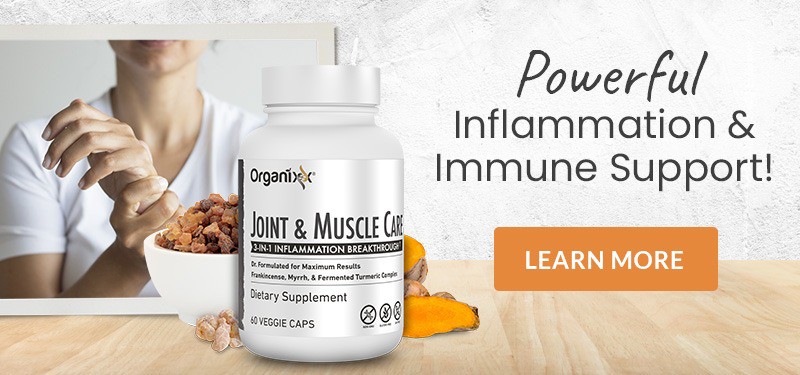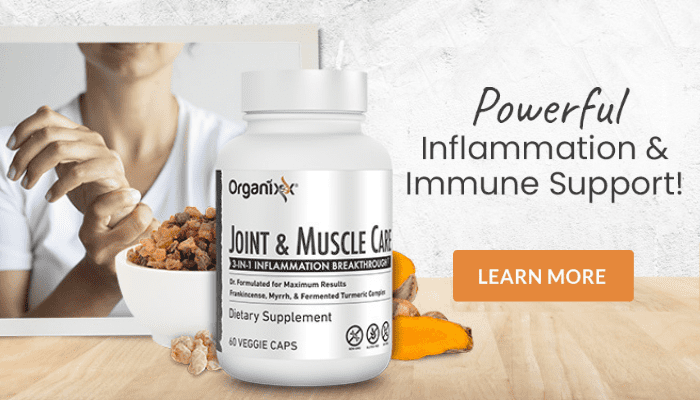Iodine is absolutely essential for every function in your body, including immune function, cardiovascular health, and metabolism. Of course, it’s most instrumental for the thyroid, since iodine is the foundation for thyroid hormone production.
According to the American Thyroid Association [1], close to half of the U.S. population suffers from lack of energy, temperature dysregulation, cognitive impairment, metabolic irregularity, and other conditions consistent with insufficient iodine intake.
The fact is that most of us need more iodine in our bodies. But what kind of iodine is right for you?
Iodine in Salt: Goiter Prevention and That’s About It
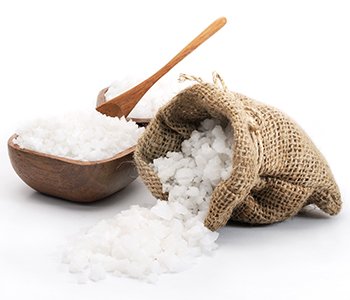 You may find it hard to believe that Americans and the rest of the world are so deficient in iodine. After all, you may think, don’t they put iodine in table salt?
You may find it hard to believe that Americans and the rest of the world are so deficient in iodine. After all, you may think, don’t they put iodine in table salt?
It’s true that most people in the U.S. and the world get most of their iodine through salt. This poses more than one challenge, however. The first issue with consuming iodine from table salt is that you will not get enough.
The addition of iodine to the U.S. salt supply started in the 1920s in response to a government health mandate. During that time, up to 40% of the population of the upper Midwest and Great Lakes region suffered from goiters and other thyroid diseases caused by extreme iodine deficiency [2]. [Note: a goiter is an enlarged thyroid gland that results in a swelling of the neck.]
Adding iodine to table salt did help with the goiter epidemic, but that was about it. Nonetheless, it became the foundation upon which the U.S. RDA, or Recommended Daily Allowance (now called the Recommended Daily Intake, or RDI [3]) was built. Today, the RDI for iodine is 150 mcg/day for an adult and 220 mcg/day for a pregnant woman. This amount may stop goiters, but it’s not enough for all the iodine needs of the body.
Toxins in “Iodized” Table Salt
The second issue with table salt is the amount of toxins that are in it. This concern was not present in the 1920s when the mandate began, but has become a reality in the age of cutting corners for safety and health in the name of big profit. While salt in the 1920s still came from the sea or mineral deposits, today’s “iodized salt” is actually a man-made form of sodium called sodium chloride (with iodide added to it).
In order to make salt white and help it last longer, most manufacturers use a bleaching process. This adds dangerous halides such as chlorine and bromide to the mix, which block the body’s absorption of iodine. In addition, other chemicals are often added to the salt, including manufactured iodide, sodium solo-co-aluminate, fluoride sodium bicarbonate, anti-caking agents, and aluminum derivatives [4].
If you are going to sprinkle salt on your food, most health experts suggest Himalayan pink salt or Celtic sea salt, which contains trace amounts of naturally produced iodine as well as other essential minerals.
Is There Iodine in Food?
Okay, so if you can’t rely on table salt to provide you with enough iodine… what about the iodine in food? Long before there were supplements, people the world over were eating enough of the right kind of foods to get the iodine they needed, correct?
If you look at the situation from a historical perspective, this is absolutely true. Foods such as seaweed, sea food, fish, eggs, spinach, dairy, strawberries, and cranberries [5] have a high iodine load when compared to other foods. In the past, eating these foods with iodine would ensure healthy amounts of iodine in the body.
Zoom in on the last 20 years or so, however, and you will see a completely different picture. The depletion of nutrients in the soil, as well as an increasing toxic load, has changed the amount of essential nutrients available in the foods we eat.
Here is a case in point: In a multi-decade study, researchers at the University of Texas analyzed the nutritional components of 43 different vegetables and fruits grown in the U.S. between 1950 and 1999. The report, published in the Journal of the America College of Nutrition [6], discovered “reliable declines” in essential vitamins and minerals in 1999 compared to 1950 samples.”
Potassium Iodine in Tablet Form
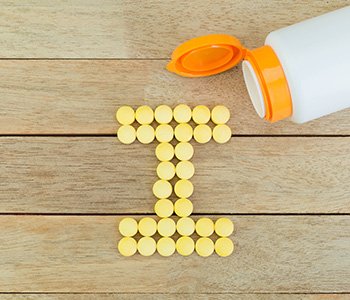 Iodine in tablet form comes in gel caps, pellets, and pills. For the most part, they are concentrates of dried kelp sources or similar substances. Molecularly, tablet form iodine is potassium iodide (KI), sodium iodide, molecular iodine, potassium iodate, sodium iodate or sodium iodine, or some combination of these.
Iodine in tablet form comes in gel caps, pellets, and pills. For the most part, they are concentrates of dried kelp sources or similar substances. Molecularly, tablet form iodine is potassium iodide (KI), sodium iodide, molecular iodine, potassium iodate, sodium iodate or sodium iodine, or some combination of these.
Potassium and sodium are often part of the picture because they act as carriers for iodine that the human body can safely absorb. Iodine in its natural state is unstable and even dangerous. Scientists discovered a while ago that combining potassium with iodine to form potassium iodide can create a more stable form, which can be absorbed by the body.
Molecular iodine, sometimes found in tablet form, is absorbed into the thyroid at a low rate but into breast tissue at a high rate. This makes molecular iodine a go-to for many who wish to help prevent breast-related conditions such as fibrocystic breast disease and breast cancer.
Researchers at Queen’s University Department of Surgery in Ontario, Canada, state in a report for the Canadian Journal of Surgery that “[the] results indicate the superiority of molecular iodine over iodides when treating fibrocystic breast disease [7].”
Research also shows that while potassium iodine cannot prevent radioactive iodine, or iodine-131, from being absorbed into the body, it can block its uptake into the thyroid immediately after high exposure. As the writers of Harvard Health, a publication of Harvard University, explain: “By flooding the body with non-radioactive iodine, the pills keep the gland from absorbing the radioactive iodine [8].”
KI is a very stable form of iodine, so by flooding the system with it right after exposure and over the next 24 hours, the thyroid gland can become “full” and will not take in any more iodine, radioactive or otherwise. This mechanism is why the World Health Organization [9] currently has protocols in place for “Iodine Prophylaxis” right after nuclear accidents. The main threats of events like Chernobyl and Fukushima is that when reactors leak, they will continue to spill radioactive Iodine-131 as well as cesium-137 into the environment for years after [10].
The downside regarding potassium iodine for everyday use is that only about 20% of this kind of iodine can be assimilated by the body.
Did you know that iodine is absolutely essential to every function in your body? Watch this video to learn how you can boost sluggish metabolism and energy.
Alcohol-Based vs Glycerin-Based Iodine
You may have noticed that some iodine supplements come in liquid form. These liquids are usually created by using either alcohol or glycerin.
The advantage of using a liquid for iodine transport is that it becomes more bioavailable to the body. Iodine in alcohol, however, is not the preferred method of liquid transport for several reasons.
First, most alcohol used for supplements are simple ethanol or grain alcohols, the same kind that the bartender puts in your favorite martini. Because of this, alcohol-based iodine may not be appropriate for young people, pets, those with high blood sugar, or those recovering from alcoholism.
In addition, almost all alcohols are made with genetically-modified corn and are not something you want to consume daily if you are striving for a healthy lifestyle [11].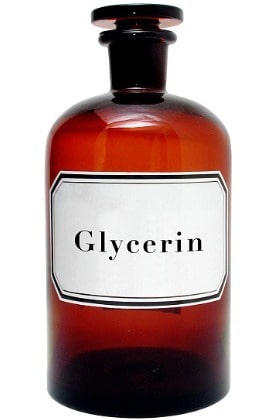
On the other hand, glycerin (also known as glycerine, glycerol, or glycerite) has many advantages – that is, if you can find the right kind. Most commercial glycerin-based products, like commercial soaps, are sourced through animal products. A better option is vegetable-based glycerin. And the best of all is organic, non-GMO glycerin that is not made from soy or corn.
Organically-derived, vegetable-based glycerin has many advantages for both external and internal use. Unlike alcohol, which is a drying agent, glycerin retains moisture and does not evaporate in air. Glycerin can be a great salve for burns and is an antiseptic as well. It won’t upset blood sugar levels and, as a boon, iodine in glycerin has a much longer, more stable shelf life.
Nascent Iodine
Nascent iodine is also known as atomic iodine, monatomic iodine, Atomidine, or colloidal iodine. The term “nascent” refers to iodine that has an incomplete number of electrons. This gives it an electrical charge, according to a report conducted by the non-profit Weston Price Foundation [12] and others.
Nascent iodine’s charge is what makes it uniquely special. Many forms of dietary iodine break down into iodide in the digestive tract. In this state, iodine-dependent organs like the thyroid and reproductive organs cannot use it. The charge of nascent iodine helps it stay intact and absorb quickly and thoroughly into the organs that need it most.
High-absorption is most helpful for the thyroid because nascent iodine can help this important gland maintain homeostasis. A balanced, properly-working thyroid ensures that that the body is operating with overall vitality, health, and strong immune function.
Which Iodine Supplement Is the Best for You?
Iodine is perhaps the most important nutrient for your body to ensure total health. For the health of your thyroid, and every organ, make sure you are getting enough highly-absorbable, organic, nascent iodine every day.
You may have deduced by now which form of iodine is the absolute best for day-to-day consumption. That’s right: a nascent iodine in a non-GMO, organic, and vegetable-based glycerin solution carrier [13]. You can get all of this in Organixx organic Iodine.
When your organs are working hard to detoxify, you want the purest form of iodine possible to help them work more efficiently. It only makes sense to use an organic form that’s totally natural and free of chemicals. Organixx Iodine is one of the only formulas that is USDA Certified Organic. It’s a pure, nascent form of iodine which your thyroid can use immediately.
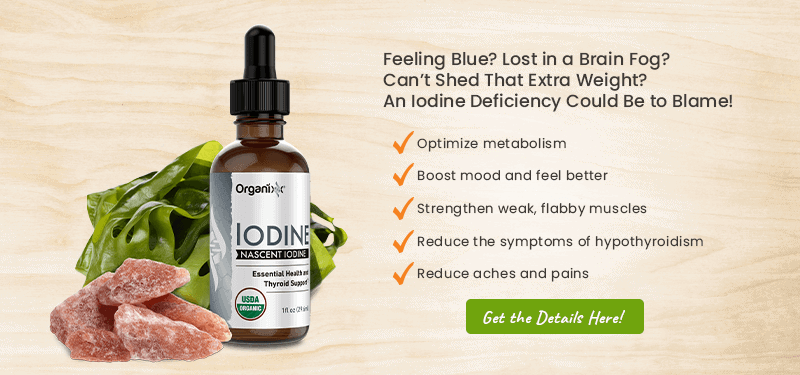
Have you ever stopped to consider what kind of shape we’d all be in if our bodies didn’t have the innate ability to protect us against disease? We’d get really sick and tired of being sick and tired all the time – that’s for sure! Having a vibrant, healthy immune system is something that most of us take for granted, especially during our younger years when it’s usually functioning at its best. But as our body grows older, so does our immune systems – a sign that it’s probably time to give it a little extra TLC.
While supporting a healthy immune system is something that everyone should be doing even from a young age, it’s especially important for folks who are getting up there in years. This is usually about the time when things start to get a little glitchy and break down; a common part of the aging process, unfortunately. But the good news is that you can help slow down the damage – or in some cases even reverse it – with proper nutritional and supplemental intervention.
If your current plan to age gracefully includes eating healthy, staying hydrated, de-stressing, and getting plenty of rest, you’re already on the right track. But what if you could take things to a whole new level by incorporating the best of what nature has to offer into your daily regimen for added support for a strong, healthy immune system?
The good news is you can, and the following five herbs will help you do just that… without breaking the bank!
Healthy Immune System Support #5 – Astragalus
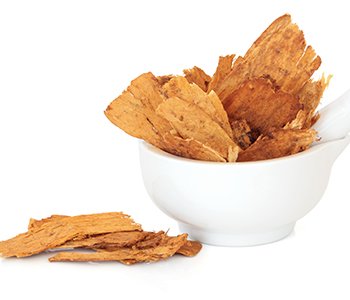 A prominent member of the legume or bean family, astragalus (astragalus membranaceus or astragalus mongholicus) has deep roots in Traditional Chinese Medicine (TCM).
A prominent member of the legume or bean family, astragalus (astragalus membranaceus or astragalus mongholicus) has deep roots in Traditional Chinese Medicine (TCM).
For many thousands of years, civilizations both past and present have used this powerful adaptogenic herb to support wellness on a variety of fronts, with perhaps its most well-known benefit being in the area of immune support.
Astragalus contains more than 200 active constituents that lend to its therapeutic efficacy. Three of these – saponins, flavonoids, and polysaccharides – are particularly noteworthy as having received special attention in the scientific literature for their pronounced impact on health and well-being.
Pharmacological studies suggest that saponins, flavonoids, and polysaccharides, as well as the hundreds of other synergistic compounds found in astragalus, work together at the systemic level to help support the body in a variety of ways. One of the most significant ways involves providing active protection against physical damage caused by free radicals, toxins, viruses, and inflammation [1].
Saponins
Considered to be the primary chemical constituent class found in astragalus, saponins are naturally-occurring plant phytochemicals that studies suggest can help support healthy cholesterol levels, ward off abnormal cell growth, and provide an extra boost to the immune system.
According to research published in 2011, Astragalus just so happens to be the world’s richest known source of cycloartane-type saponins, which have been shown to exhibit strong cardiotonic, hypocholesteremic, antidepressive, antiblastic, and immunomodulatory properties [2].
Flavonoids
These colorful antioxidant plant pigment compounds have been shown to help facilitate proper cell signaling while scavenging inflammation-causing free radicals from cellular tissue. Their benefits extend beyond this to the immune system as well, as flavonoids are arch enemies to both cancer and heart disease, as demonstrated in numerous scientific studies [3].
Polysaccharides
Also known as glycans, polysaccharides are molecularly-bonded simple sugars that serve as energy stores in the body. Because of this special molecular bond, polysaccharides are technically complex carbohydrates that serve as the body’s primary source of energy. Evidence suggests that polysaccharides possess powerful antimicrobial, antiviral, and anti-inflammatory properties that further lend to their bioactive nature of astragalus [4].
Healthy Immune System Support #4 – Echinacea
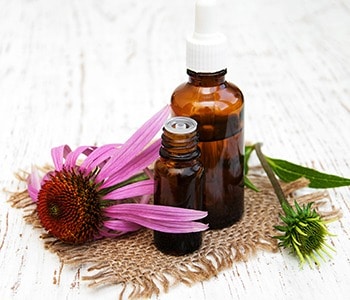 A wildly popular folk remedy for treating the common cold, echinacea (Echinacea purpurea), extracted from the Eastern Purple Coneflower, is one of the few immune-supportive herbs that’s actually native to North America.
A wildly popular folk remedy for treating the common cold, echinacea (Echinacea purpurea), extracted from the Eastern Purple Coneflower, is one of the few immune-supportive herbs that’s actually native to North America.
The Great Plains Indian tribes long used the flowers, leaves, and roots of echinacea to make herbal tinctures and other botanical therapeutics before this herb ever caught on in modern times as an effective natural alternative to antibiotics and other drug-based medications.
Every part of the echinacea plant seems to present its own unique therapeutic flavor. The roots tend to contain the highest concentration of volatile oils, while the flowers and leaves contain higher amounts of polysaccharides. While polysaccharides are more closely associated with immune function, a great many of echinacea’s other constituents are also said to have an immuno-stimulating effect, including the plant’s flavonoids and essential oils.
In Germany, the above-ground portions of the echinacea plant are officially approved as a natural remedy for treating urinary and upper respiratory tract infections, as well as slow-healing wounds and colds [5].
Echinacea is also widely used to fight back against influenza, with the largest clinical trial ever conducted on the herb suggesting that it exerts a profoundly positive impact on a weakened immune system [6].
Healthy Immune System Support #3 – Frankincense
The origins of its treasured use tend to center around Northern Africa and the Middle East. But frankincense (Boswellia carterii or Boswellia sacara) is gaining quite the reputation all around the world in modern times as a natural therapeutic with a whole lot of untapped healing potential.
Evidence exists to suggest that frankincense is effective in helping to balance the 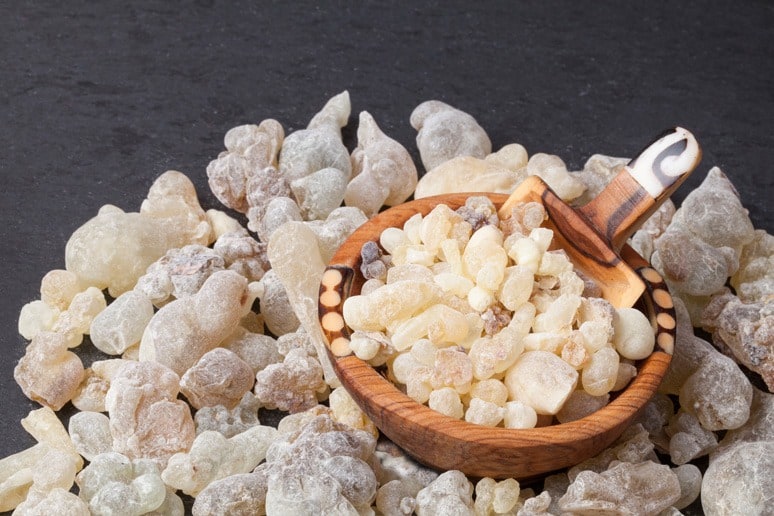 mind, body, and soul in truly profound ways that science is only just beginning to fully discover.
mind, body, and soul in truly profound ways that science is only just beginning to fully discover.
Often referred to as olibanum, frankincense is commonly used as a natural remedy to calm stress and anxiety, as well as to manage pain and support an all-around healthy lifestyle free of damaging inflammation. Its essential oils are believed to help facilitate the transmission of messages to the limbic system of the brain, which in turn has a direct impact on promoting optimal function within the central nervous system [7].
Specific to the immune system are the reported benefits of frankincense in enhancing its functionality. Studies also show that frankincense exhibits a powerful antimicrobial effect against harmful bacteria and viruses. It may even be a viable weapon against abnormal cell growth, as numerous trials have demonstrated its pro-apoptotic and anti-proliferative effects [8].
Healthy Immune System Support #2 – Myrrh
Derived from the Arabic word “murr,” which means bitter, myrrh (Commiphora myrrha) has rich historical significance both as an aromatic spice and as a natural remedy for an assortment of ailments. Studies suggest that myrrh has a particular appetite for conditions marked by chronic inflammation. It’s also a powerful detoxifier, helping to rid the body of toxic metals such as lead [9].
The yellowish-orange essential oil extracted from myrrh resin contains two key constituents that to a large extent demarcate its therapeutic efficacy: terpenoids and sesquiterpenes.
Terpenoids
Only in more modern times has this particularly aromatic antioxidant class been identified as having therapeutic significance. Studies show that the terpenoids in myrrh may help to prevent fats and other metabolites in plants against oxidation, and that similar benefits are possible in humans as well [10]. Research has also shown that myrrh terpenoids possess unique anti-inflammatory properties that can help support a well-functioning body [11].
Sesquiterpenes
The “other half” to terpenoids, sesquiterpenes, are another class of restorative compounds that can help support a healthy immune system in a variety of ways. The sesquiterpenes specific to myrrh possess powerful antibacterial and antifungal properties that lend to the herb’s reported effectiveness in purification and cleansing [12].
This is why myrrh was commonly used in ancient times to embalm the dead. Sesquiterpenes are also said to be supportive in keeping inflammation at bay, as well as in helping to balance emotions and hormone levels [13].
Healthy Immune System Support #1 – Turmeric
 It’s hard to know where to start with this ancient “golden” spice because, honestly, it does so much.
It’s hard to know where to start with this ancient “golden” spice because, honestly, it does so much.
More than 6,000 peer-reviewed papers confirm that turmeric (Curcuma longa) is a functional food of the highest order.
Specifically, these studies suggest that turmeric can be effectively used to support health in a multitude of ways including to help combat depression, manage pain, and soothe the stomach and gut. Many people also take it to help keep their cholesterol levels in check.
But where science suggests that turmeric may hold the most promise is in the area of inflammation support. Curcumin, the believed-to-be primary active constituent in turmeric, is considered by many to be one of the most potent anti-inflammatory substances known to mankind.
The combined results of many different studies reveal that curcumin can even trump many pharmaceutical drugs with its incredible ability to take on a variety of maladies, including those that affect the blood, brain, heart, gut, and central nervous system [14].
The anti-inflammatory properties of curcumin are further well-documented, showing that this bioactive substance interacts with many different molecular targets associated with inflammation.
One research paper published in 2009 in the journal Alternative Medicine Review stated that “based on early cell culture and animal research, clinical trials indicate curcumin may have potential as a therapeutic agent in diseases such as inflammatory bowel disease, pancreatitis, arthritis, and chronic anterior uveitis, as well as certain types of cancer [15].”
The paper’s author went on to say that:
“Curcumin’s potent anti-inflammatory properties have led to active research on its use for a variety of inflammatory conditions, including postoperative inflammation, arthritis, uveitis, inflammatory pseudotumors, dyspepsia, irritable bowel syndrome, inflammatory bowel disease, pancreatitis, and Helicobacter pylori infection.”
Joint & Muscle Care is a revolutionary supplement that takes three of the strongest inflammation support agents in nature (frankincense, myrrh, and turmeric), and combines them in the same perfect union treasured by the ancients. Available in capsule form or as an essential oil blend called Magi-Complexx.
